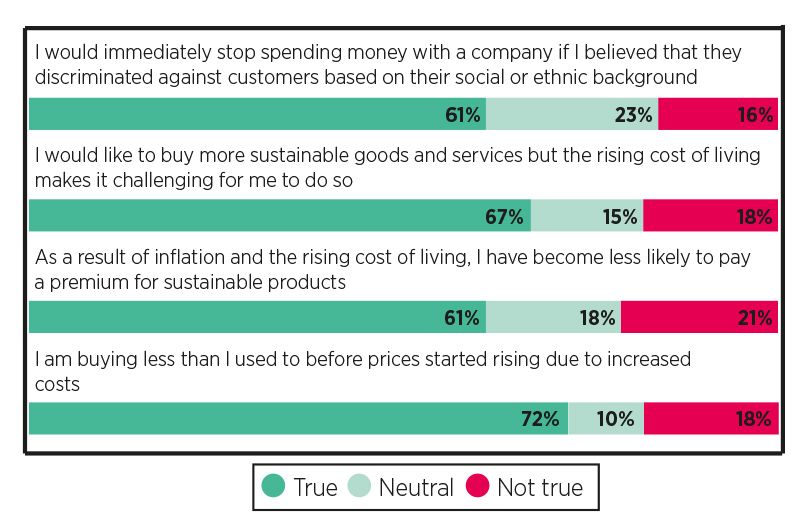The cost-of-living crisis has caused a shift in consumers’ green behaviour, but not all are a positive for the environment.
Research by numerous bodies has found consumers are adopting greener habits in terms of recycling and mending old products, objects or garments instead of replacing them, but when it comes to making new purchases, they are not selecting sustainable options that they view as costing a premium.
Greener habits
The teams behind the F&C Investment Trust and online community Millennial Money UK recently asked Opinium to survey 2,000 UK adults between 28 October and 1 November 2022 asking about their spending habits changed amid higher prices for energy and consumer goods.
New measure adopted include making do and mending (34%), embracing second-hand shopping (28%), and growing produce at home (24%). Two in five adults (31%) have been supplementing their income by selling personal goods on online marketplaces, minimising contributions to landfill, while the majority having curbed or are taking less foreign holidays (52%) and are cutting energy use (51%).
“Being green and a drive to sustainability has been at the forefront of consumers’ minds, particularly over the last five years and it’s fascinating to see how macro issues such as inflation – and the pandemic – can affect consumers’ sustainability habits in a good way,” said Patrick Thomas, head of ESG investing at Canaccord Genuity Wealth Management (CGWM) and member of the ESG Clarity Committee.
“That’s a positive move,” he added.
Unsustainable costs
However, with a closer focus on costs and budgeting, UK adults have had to sacrifice some habits. The research found 50% of UK adults have switched from renewable to non-renewable tariffs – considered cheaper – or plan to do so in the next six months, and four out of ten are heating their homes with wood fires to minimise energy bills.
They are also opting for less sustainable but cheaper brands, with 35% indicating this, eating less ethical, local or organic food (28%), and driving more instead of paying for public transport (17%).
Laith Khalaf, head of investment analysis at AJ Bell, commented: “In such an extreme crunch on consumer finances, pressure gets applied across all segments of the market, but price becomes a much more significant factor in purchasing habits, which is likely to be to the detriment of more environmentally friendly products that tend to come with additional costs. These may prove a luxury few feel they can afford in the coming year.”
Juliet Schooling Latter, research director at Chelsea Financial Services, said she knows from experience that trying to consume sustainably is a lot more expensive.
“Cost is the key factor and unfortunately, we are all hooked on cheap, unsustainable consumption. People may want to be sustainable but only if it makes economic sense them. They certainly aren’t willing to pay up for sustainable brands in the environment when all their costs are increasing, and they are having to prioritise.”
Thomas added: “For people who are worried about living costs and the price of their weekly shopping, the more costly sustainable and organic products (and less sustainably focused but cheaper energy provider) will prove more popular, as consumers are forced to make a choice. That’s a sad state of affairs but hopefully over time, the cost of sustainable brands and products will come down, as consumer demand rises to meet it.”
He flagged that brands such as Tesla, Patagonia, Lululemon, Veja and milk alternatives are continuing to do well supported by consumers in the upper end of the income bracket.
Awareness
However, there is a clear willingness to be greener; Debt management service company Intrum also recently surveyed 24,000 European consumers about the payment behaviours and spending habits. Almost 70% said they would like to buy more sustainable goods and services, but the rising cost of living makes this challenging. Over half also said they will not buy from a company they know is responsible for harming the environment.

The millennial generation is also showing high levels of concern for the environment and are willing to pay a less significant premium price (64%) for sustainable products, according to research looking at sustainable fashion carried out by Bain & Company and the WWF Italy.
“Inflation might have derailed people’s sustainable buying habits, but this is a temporary blip. People are worried about the planet’s future and that sentiment will prevail,” CGWM’s Thomas commented.
Government pressure
These changes in spending behaviour, even if they are temporary, should prompt governments and policymakers to ensure their sustainability commitments are met, said industry experts.
Vanessa Söderberg, global sustainability director at Intrum, commented: “The cost-of-living crisis and geopolitical situation are, understandably, occupying a large amount of policymakers’ time and attention. With the battle against climate change also at a crucial point, however, sustainability must remain high on the agenda.
“Consumers say they are less able to pay a premium for sustainable products, raising the bar even higher for governments and businesses to ensure their own targets and commitments are kept.”
The only way to change these consumer habits is through government legislation, added Schooling Latter – she gave the banning of single-use plastic as an example.
“If we all consume less and consider whether purchases are really essential, it will be good for the environment but bad for economic growth. This is where the conflict lies for government,” she said.
See also: – Governments must incentivise the transition

